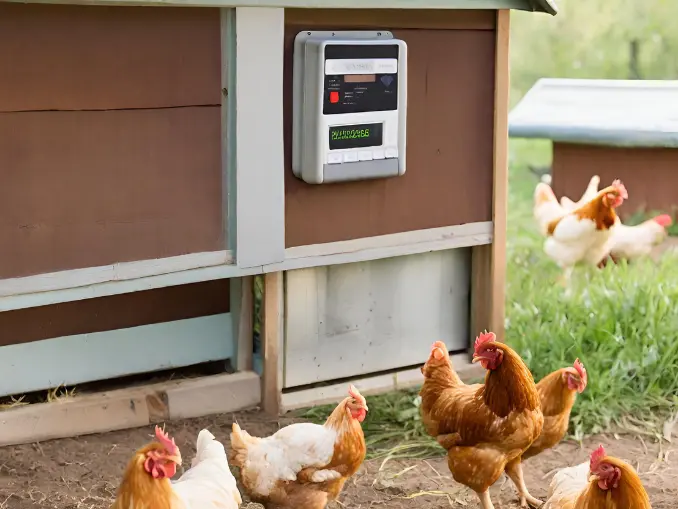Predator-Proof Your Poultry with the Latest Electronic Alarms
In the world of poultry farming, one constant battle that keeps farmers awake at night is protecting their feathered flock from relentless predators. The threat of cunning foxes, raccoons, owls, and other intruders is ever-present, causing heartbreaking losses and disrupting the harmony of your farm.
So, in this article, we’ll explore how the latest electronic alarm systems are revolutionizing poultry protection, ensuring that your beloved birds remain safe and sound. It’s time to predator-proof your poultry and secure your peace of mind.
Table of Contents
What Are Electronic Alarms as a Predator-Proofing Solution?
Electronic alarms are a modern and effective predator-proofing solution used in various contexts to deter and detect potential threats to a given area, such as homes, businesses, or livestock enclosures. These alarms typically consist of sensors and monitoring systems that detect unauthorized intrusions or unusual activities.
Common components include motion detectors, door/window sensors, security cameras, and sometimes even sound or vibration sensors. When triggered, these sensors send signals to a central control panel, which can activate alarms, alert property owners or security personnel, and even notify law enforcement or monitoring services.
If you are in search of a cutting-edge predator-proofing solution for your property. You can consider looking at the MAGIC CAT Solar Nocturnal Animal Repeller.
Types of Electronic Alarms for Poultry Protection
Electronic alarms play a crucial role in protecting poultry, especially from predators and other external threats. Here are some common types of electronic alarms used for poultry protection:
Motion Sensors
These alarms detect movement around the poultry area. When a predator or an unwanted visitor approaches, the sensor triggers an alarm. This can either be a physical alarm on the premises or a notification sent to your phone or computer. Motion sensors are often equipped with infrared technology to detect movement even in the dark.
Sound Alarms
These alarms produce loud, startling noises when triggered. They are designed to scare away predators or trespassers. You can customize the sound, ranging from high-pitched tones to loud sirens, depending on the level of deterrence required. You can activate it by motion sensors or manually.
Light Alarms
Similar to sound alarms, light alarms use bright, flashing lights to deter predators and intruders. They are often used in conjunction with motion sensors. The sudden burst of light can startle and confuse predators, discouraging them from approaching the poultry area. Light alarms are particularly effective at night.
Remote Monitoring Systems
These sophisticated systems allow you to monitor your poultry remotely through cameras and sensors. They can include features like motion detection, night vision, and even thermal imaging. Alerts are sent also to your phone or computer for immediate action if there is an intrusion. Some systems also allow for remote control of lights, sounds, or other deterrents to protect the poultry.

Benefits of Using Electronic Alarms in Your Chicken Coop
Enhanced Security Against Predators
By installing electronic alarms, you actively deter predators. Motion sensors, sound alarms, and light alarms work together to scare off potential threats, keeping your chickens safe.
Peace of Mind
Knowing that your chicken coop is equipped with alarms allows you to relax. You don’t have to constantly check on your chickens throughout the night or when you’re away. If anything unusual happens, the alarm system will alert you immediately.
Remote Monitoring Capabilities
With remote monitoring systems, you can keep an eye on your chickens from anywhere. This means you can quickly respond to any issues, even when you’re not physically present. It’s a convenient way to manage your poultry farm efficiently.
Prevention of Theft and Vandalism
Electronic alarms also protect against human threats like theft or vandalism. Intruders are less likely to target a chicken coop that is visibly secured with alarms and monitoring systems.
Reduced Losses and Increased Productivity
By minimizing attacks from chicken predators and other threats, you reduce the loss of your chickens. Healthy and stress-free chickens are more productive, which can lead to better egg production and growth.
Customizable and Scalable Solutions
Electronic alarm systems offer flexibility. You can choose and combine different types of alarms based on your specific needs and the size of your coop. As your poultry farm grows, these systems can be easily scaled up to provide continuous protection.

How to Select the Right Electronic Alarm System
Assessing Your Poultry Farm’s Specific Needs and Risks
- Identify Potential Threats: Consider the types of chicken predators common in your area and any other security concerns, like theft or vandalism. Understanding what you’re protecting your chickens from is key.
- Analyze Your Coop’s Layout: Look at the size and design of your chicken coop. Larger areas might require more extensive coverage, while smaller coops might need simpler systems.
- Environmental Conditions: Consider the local weather and environmental conditions. Your alarm system should be robust enough to withstand the elements, be it rain, snow, or extreme temperatures.
Budget Considerations
- Initial Investment vs. Ongoing Costs: Understand the upfront costs of purchasing and installing the system versus the ongoing costs of maintenance and potential upgrades.
- Cost-Benefit Analysis: Weigh the cost of the system against the potential losses it could prevent. A higher initial investment might save you more in the long run.
- Look for Scalability: Choose a system that can grow with your needs. Starting with a basic system and adding features as needed can be more cost-effective.
Compatibility with Existing Infrastructure
- Integration with Current Systems: If you already have some security or monitoring tools like security cameras or electric poultry fencing in place, find an alarm system that can integrate seamlessly with these.
- Ease of Installation and Use: Consider how easy the system is to install and operate. You don’t want to invest in technology that requires excessive time or expertise to manage.
- Check for Wireless or Wired Systems: Decide between wireless or wired systems based on your existing infrastructure. Wireless systems offer more flexibility but may require more maintenance
Ease of Installation and Maintenance
- Look for User-Friendly Systems: Choose systems known for their ease of installation. Some systems offer a plug-and-play setup, which is ideal if you’re not technically inclined.
- Read Reviews for Maintenance Insights: Check customer reviews and testimonials to gauge the maintenance needs of different systems. Look for feedback on long-term reliability and any recurring issues.
- Availability of Technical Support: Ensure that the manufacturer or supplier offers good technical support. Access to professional help for installation and maintenance can be a significant advantage.
- Consider Modular Systems: Systems that allow for easy replacement or upgrading of individual components can simplify maintenance.
Researching and Comparing Available Alarm Systems
- Conduct Online Research: Start by searching online for alarm systems specifically designed for poultry farms. Visit manufacturer websites, read product descriptions, and look for any comparative studies or reviews.
- Ask for Recommendations: Reach out to other poultry farmers or farming forums to get recommendations based on firsthand experiences.
- Compare Features and Prices: Make a list of potential systems and compare their features, prices, and user reviews. Look for systems that offer the best balance of features, reliability, and cost.
- Check for Compliance and Certifications: Ensure that the systems comply with relevant industry standards and have necessary certifications, indicating their quality and reliability.
- Demo or Trial Periods: If possible, choose a system that offers a demo or trial period. This allows you to test the system in your specific environment before fully committing.
Equipped Your Coop with Electronic Alarms Now
Predator-proofing your poultry is not just a necessity; it’s a commitment to the well-being of your birds and the success of your farm. The latest electronic alarm systems offer a proactive and effective approach to safeguarding your poultry, providing you with peace of mind and allowing you to focus on what you do best – nurturing and growing your flock.
Say goodbye to sleepless nights and confidently embrace a future where your poultry can thrive, safe from the threats of the wild. It’s time to invest in the latest electronic alarms and protect your poultry like never before.






